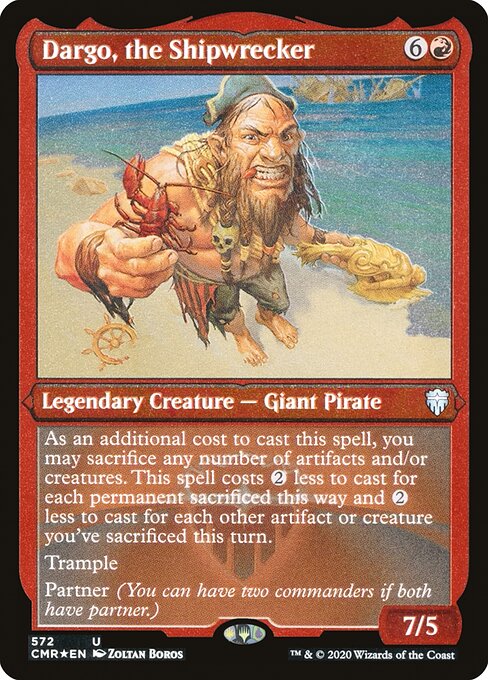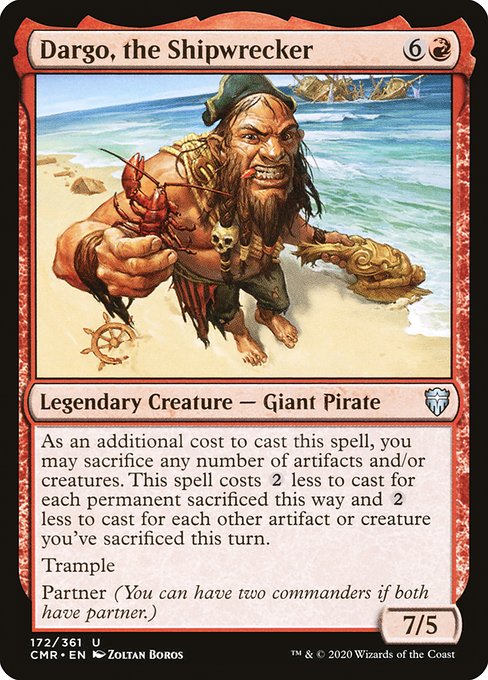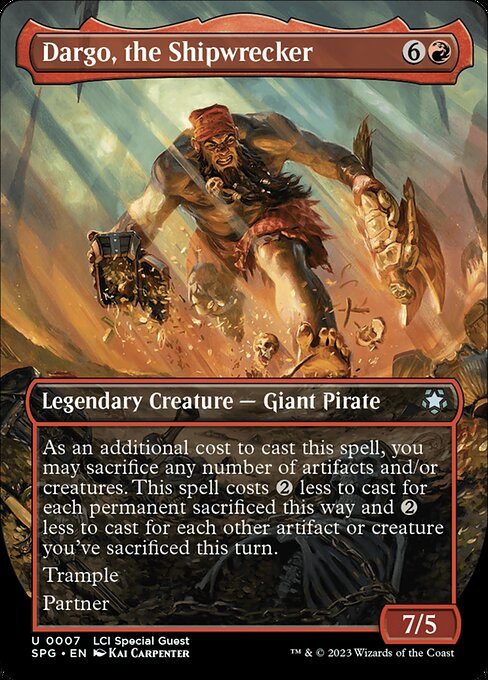Dargo, the Shipwrecker
Legendary Creature — Giant Pirate
As an additional cost to cast this spell, you may sacrifice any number of artifacts and/or creatures. This spell costs less to cast for each permanent sacrificed this way and less to cast for each other artifact or creature you've sacrificed this turn.
Trample
Partner (You can have two commanders if both have partner.)
Trample
Partner (You can have two commanders if both have partner.)
7/5
standard
future
historic
gladiator
pioneer
explorer
modern
legacy
pauper
vintage
penny
commander
brawl
alchemy
paupercommander
duel
oldschool
premodern
Rulings
To determine the total cost of a spell, start with the mana cost or alternative cost you’re paying, add any cost increases (such as the commander tax), then apply any cost reductions (such as that of Dargo’s first ability). Dargo’s converted mana cost is 7, no matter what the total cost to cast it was.
The cost reduction for artifacts and creatures sacrificed earlier in the turn will apply even if you don’t sacrifice any as an additional cost.
You can choose two commanders with partner that are the same color or colors. In Commander Draft, you can even choose two of the same commander with partner if you drafted them. If you do this, make sure you keep the number of times you’ve cast each from the command zone clear for “commander tax” purposes.
The cost reduction is per sacrificed permanent, whether that permanent was an artifact, a creature, or both.
Once the game begins, your two commanders are tracked separately. If you cast one, you won’t have to pay an additional the first time you cast the other. A player loses the game after having been dealt 21 damage from any one of them, not from both of them combined.
Both commanders start in the command zone, and the remaining 98 cards (or 58 cards in a Commander Draft game) of your deck are shuffled to become your library.
To have two commanders, both must have the partner ability as the game begins. Losing the ability during the game doesn’t cause either to cease to be your commander.
Dargo’s first ability can’t reduce its cost below . You can sacrifice any number of artifacts and creatures, even if they won’t reduce Dargo’s cost any further.
If your Commander deck has two commanders, you can only include cards whose own color identities are also found in your commanders’ combined color identities. If Falthis and Kediss are your commanders, your deck may contain cards with black and/or red in their color identity, but not cards with green, white, or blue.
An effect that checks whether you control your commander is satisfied if you control one or both of your two commanders.
If something refers to your commander while you have two commanders, it refers to one of them of your choice. If you are instructed to perform an action on your commander (e.g. put it from the command zone into your hand due to Command Beacon), you choose one of your commanders at the time the effect happens.
The cost reduction for artifacts and creatures sacrificed earlier in the turn will apply even if you don’t sacrifice any as an additional cost.
You can choose two commanders with partner that are the same color or colors. In Commander Draft, you can even choose two of the same commander with partner if you drafted them. If you do this, make sure you keep the number of times you’ve cast each from the command zone clear for “commander tax” purposes.
The cost reduction is per sacrificed permanent, whether that permanent was an artifact, a creature, or both.
Once the game begins, your two commanders are tracked separately. If you cast one, you won’t have to pay an additional the first time you cast the other. A player loses the game after having been dealt 21 damage from any one of them, not from both of them combined.
Both commanders start in the command zone, and the remaining 98 cards (or 58 cards in a Commander Draft game) of your deck are shuffled to become your library.
To have two commanders, both must have the partner ability as the game begins. Losing the ability during the game doesn’t cause either to cease to be your commander.
Dargo’s first ability can’t reduce its cost below . You can sacrifice any number of artifacts and creatures, even if they won’t reduce Dargo’s cost any further.
If your Commander deck has two commanders, you can only include cards whose own color identities are also found in your commanders’ combined color identities. If Falthis and Kediss are your commanders, your deck may contain cards with black and/or red in their color identity, but not cards with green, white, or blue.
An effect that checks whether you control your commander is satisfied if you control one or both of your two commanders.
If something refers to your commander while you have two commanders, it refers to one of them of your choice. If you are instructed to perform an action on your commander (e.g. put it from the command zone into your hand due to Command Beacon), you choose one of your commanders at the time the effect happens.
Rulings
To determine the total cost of a spell, start with the mana cost or alternative cost you’re paying, add any cost increases (such as the commander tax), then apply any cost reductions (such as that of Dargo’s first ability). Dargo’s converted mana cost is 7, no matter what the total cost to cast it was.
The cost reduction for artifacts and creatures sacrificed earlier in the turn will apply even if you don’t sacrifice any as an additional cost.
You can choose two commanders with partner that are the same color or colors. In Commander Draft, you can even choose two of the same commander with partner if you drafted them. If you do this, make sure you keep the number of times you’ve cast each from the command zone clear for “commander tax” purposes.
The cost reduction is per sacrificed permanent, whether that permanent was an artifact, a creature, or both.
Once the game begins, your two commanders are tracked separately. If you cast one, you won’t have to pay an additional the first time you cast the other. A player loses the game after having been dealt 21 damage from any one of them, not from both of them combined.
Both commanders start in the command zone, and the remaining 98 cards (or 58 cards in a Commander Draft game) of your deck are shuffled to become your library.
To have two commanders, both must have the partner ability as the game begins. Losing the ability during the game doesn’t cause either to cease to be your commander.
Dargo’s first ability can’t reduce its cost below . You can sacrifice any number of artifacts and creatures, even if they won’t reduce Dargo’s cost any further.
If your Commander deck has two commanders, you can only include cards whose own color identities are also found in your commanders’ combined color identities. If Falthis and Kediss are your commanders, your deck may contain cards with black and/or red in their color identity, but not cards with green, white, or blue.
An effect that checks whether you control your commander is satisfied if you control one or both of your two commanders.
If something refers to your commander while you have two commanders, it refers to one of them of your choice. If you are instructed to perform an action on your commander (e.g. put it from the command zone into your hand due to Command Beacon), you choose one of your commanders at the time the effect happens.
The cost reduction for artifacts and creatures sacrificed earlier in the turn will apply even if you don’t sacrifice any as an additional cost.
You can choose two commanders with partner that are the same color or colors. In Commander Draft, you can even choose two of the same commander with partner if you drafted them. If you do this, make sure you keep the number of times you’ve cast each from the command zone clear for “commander tax” purposes.
The cost reduction is per sacrificed permanent, whether that permanent was an artifact, a creature, or both.
Once the game begins, your two commanders are tracked separately. If you cast one, you won’t have to pay an additional the first time you cast the other. A player loses the game after having been dealt 21 damage from any one of them, not from both of them combined.
Both commanders start in the command zone, and the remaining 98 cards (or 58 cards in a Commander Draft game) of your deck are shuffled to become your library.
To have two commanders, both must have the partner ability as the game begins. Losing the ability during the game doesn’t cause either to cease to be your commander.
Dargo’s first ability can’t reduce its cost below . You can sacrifice any number of artifacts and creatures, even if they won’t reduce Dargo’s cost any further.
If your Commander deck has two commanders, you can only include cards whose own color identities are also found in your commanders’ combined color identities. If Falthis and Kediss are your commanders, your deck may contain cards with black and/or red in their color identity, but not cards with green, white, or blue.
An effect that checks whether you control your commander is satisfied if you control one or both of your two commanders.
If something refers to your commander while you have two commanders, it refers to one of them of your choice. If you are instructed to perform an action on your commander (e.g. put it from the command zone into your hand due to Command Beacon), you choose one of your commanders at the time the effect happens.
Your collection? Your decks?
Want to manage your collection and/or create decks?



 0
0
 0.13€
0.13€
